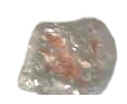|
CHRYSOCOLLA
|
 |
A silicate containing copper, hydrogen, silica and oxygen. It is green to blue in colour and takes different forms depending on the minerals it is combined with e.g. quartz or chalcedony. If chrysocolla is combined with other materials it is harder and usable for jewellery
It forms in copper deposits which become oxidized by air or water. Geologists can use it's presence to find copper because this is often located nearby.
Best deposits can be found in Chile but also in Arizona, Nevada, Italy, Russia and Cornwall, UK.
A very hard mineral (8 on the mohs scale) and a member of the silicate group. It is transparent with a glassy appearance and may be colourless or a variety of colours as the result of being in combination with metals such as iron or chromium. It's colour can also be altered by treatment with gamma rays or by heating. Yellow and orange coloured topaz tends to be the most valuable.
It occurs in granite rocks and quartz deposits but the finest samples can be found in Brazil. Large deposits can also be found in Russia and Mexico.
